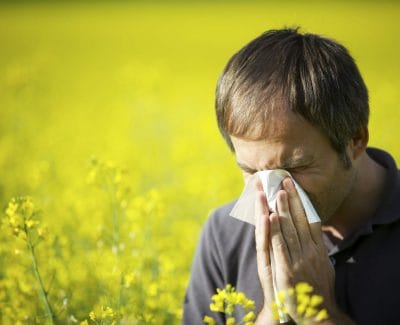Introduction
Do you have a runny nose, sneezing, itchy/watery red eyes, and stuffy nose in the same season year after year? Do you have these problems year-round? Do you seem to get “colds” often? If so, you may be suffering from a common condition known as hay fever or allergic rhinitis. Understanding the causes, symptoms, and treatments can help you better manage your symptoms.
Causes
Allergic rhinitis is a condition where the body reacts to things in the environment that should not cause a reaction, like dust or dander. Even everyday things in the environment can trigger symptoms in certain people. Hay and weeds are common triggers. Pollen from grasses and trees, molds, dust mites, and animal dander can also cause symptoms. The various pollens produce seasonal symptoms. Molds, dust mites, and animal dander may result in year-round symptoms. Since pollen and mold counts can vary widely, many resources are available to determine which ones are in your region. They also describe when they tend to be highest in amounts (www.pollen.com). Whether the trigger is grass, mold, or something else, the result is the same. Histamine and other chemicals are released in the body. This causes the symptoms of allergies.
Symptoms
A runny nose, sneezing, and stuffy nose are common nose symptoms. Other areas of the body can also have signs of allergies. Itchy, red, or watery eyes can be signs of eye symptoms. Other signs can be feeling the ears are clogged, sore throat, trouble with cough, hoarse voice, wheezing, and feeling tired. Chronic sinus and ear infections and even asthma may accompany allergic rhinitis.
Diagnosis
Your doctor may order a test to figure out if you have allergies. Two kinds of tests are common: skin testing or a special type of blood test called specific IgE testing. For skin testing, a small amount of liquid that comes from different kinds of things that can cause allergies is pricked or injected into the skin. It is then checked for a reaction after waiting several minutes. You may develop a bump and redness in the testing area if you are allergic. For blood testing, a sample of your blood is drawn and sent to the lab. In this test, levels of an antibody to things that cause allergy are measured. They may be higher if you are allergic.
Treatment
There are several ways to manage allergies:
Avoidance/Environmental Control Measures
One way is to try things that will prevent you from being exposed to things in your surroundings that cause allergies. Whether these things really help your symptoms isn’t clear. Some of the things listed below may be helpful for some people who have bad allergies.
For pollen
- Stay inside when there are large amounts of pollen in the air (early in the morning)
- Keep windows closed and use air conditioning if you can.
- Use special types of allergy filters on vacuum cleaners or air ducts called HEPA air filters.
- Wear a dust mask if working outdoors, change clothing, and shower when you come inside.
For mold
- Fix water leaks, areas of your home or walls that have damage from water, and clean and dry damp places.
- Avoid having indoor plants. Mold can live in the soil.
- Throw away any moldy food
- Keep humidity low (<50%)
For dust mites
- Wash bed sheets at least once a week in hot water > 140 degrees F.
- Cover pillows, mattresses, and box springs with dust mite covers.
- Keep humidity low (<50%).
- Remove things like drapes, extra pillows, stuffed animals, and other items that tend to collect extra dust.
- Use special types of allergy filters on vacuum cleaners or air ducts called HEPA air filters.
For animal dander
- Keep pets out of the bedroom.
- Wash your hands after petting or holding animals.
- Use special types of allergy filters on vacuum cleaners or air ducts called HEPA air filters.
For cockroach
- Throw away leftover food and clean up any crumbs
- If you see live bugs, calling a pest control expert can help
- Caulk cracks and crevices in the house
Medications
There are many safe medicines that work that you can take to help your symptoms. If over-the-counter medicines do not help you, your doctor may send you prescription medicines. The most common allergy medicines are nasal steroid sprays and oral/nasal antihistamines. Sometimes, using these different types of nasal sprays together can be even more helpful. Nasal steroid sprays work by reducing the inflammation in your nose, but they take time to work, and you may not notice a change right away. Other medicines and nasal sprays work on different chemicals in your body that can cause allergy symptoms. Your doctor will help you decide whether these medications are right for you. Nasal salt water rinses can help keep your nose healthy by washing mucus, pollens, pollution, and other things out of your nose. Your doctor will help you determine which medicines work best for your symptoms.
Immunotherapy
Immunotherapy is a way to make you not allergic to what you are allergic to. It is a type of treatment that works for allergies. It can help improve and control your allergy symptoms when medicines don’t work or you cannot avoid your allergy triggers. One kind of immunotherapy is allergy shots [SCIT]. Another kind of immunotherapy that is becoming more popular is allergy drops or tablets [SLIT], where drops or tablets are placed under your tongue. There are different kinds of SLIT tablets that are available in the United States. If you want to learn more about these kinds of treatments, a doctor specializing in allergies can help you.

